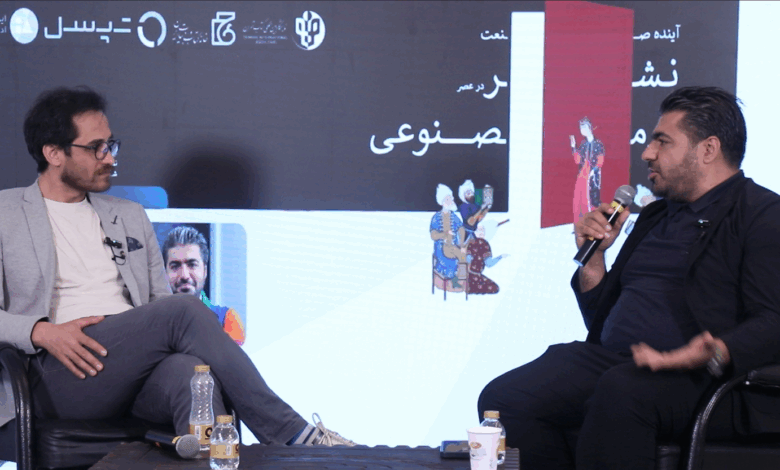A series of sessions on the publishing industry in the age of AI will be held at the 36th International Book Fair, emphasizing the importance of utilizing AI. The session was held in the Publishing Technology Hall with the presence of Zoheir Gharazi, a professor at the University of Tehran, on the threat posed to Persian language models.
According to Ideaagency, In a conversation with Sadegh Attarzadeh, Zoheir Gharazi, a professor at the University of Tehran, said about the threat to Persian language models: “AI currently knows other languages better, and the Persian language is threatened in various ways in this area. The authority of language in AI is in the hands of the governments that support those languages.”
Pointing out that there will undoubtedly be a change in the language model in the near future, he explained: “Persian is spoken fluently at the present time, but our youth in the future will probably not be able to read the works of Saadi, Hafez, and Ferdowsi easily because other language models will prevail. In the next 60 years, there is a very high probability that no one will speak Persian because the new generation will use other models.”
Regarding the status of language models in AI, Gharazi admitted: “Today, investments are being made in language models in living languages of the world such as French, English, and Chinese, but we have not invested in Persian. I invite relevant institutions and organizations such as the Saadi Foundation, the Persian Language Foundation, and the National Library to invest in language models in AI.”
He added: “When we don’t recognize the model, we fall behind and its control is lost. Nothing good will happen under these conditions, and in the coming years they won’t recognize our language models, and in another hundred years they will destroy our library.”
Announcing this good news to not fall behind the world of technology, the University of Tehran professor said: “The good news is that the world has just entered this field and it is time for us to enter it too. The first step to enter is to properly understand AI. When we do not understand a concept, we cannot interact with it.”
Regarding publishers’ lagging behind in utilizing AI, Gharazi said: “What percentage of managers currently use AI applications such as navigation? What percentage of business decision-makers are familiar with new AI technologies and know the literature on using messengers? Because they are not familiar, they do not know what their benefits are, and its threats are highlighted for them. The most important thing is that we can integrate our publishing with AI.”
He added: “We have reached the stage where when applications like Chat GPT and DeepSik are asked a question, they answer the question by understanding the concept. The next model is that artificial intelligence personalizes the answer, meaning it responds based on your choices, history, and personality. The next stage is that it carries out a series of requests, for example, telling you where to take you.”
“Perhaps we can say that under these conditions, our language model is not under pressure, but the next stage is decision-making, which is considered the most advanced stage. When it comes to this, is there an understanding of the Persian language that should exist? No, it is a threat.”
Referring to the naming issue for the Persian Gulf, which has become a challenge in recent years, the university professor explained: “Who determines what the name of this gulf is? Google announces that it has a professor and an article based on which it has chosen another name for it. When we do not have the Persian language model and do not invest in it, and when we have not read all the authoritative books in NLM, AI will give us priority over the analyses of the competing language model. Today’s story is different from the past and cannot be solved with an action such as a protest comment.”
He added: “Publishers of Persian books must register with the NLM for the survival of the language. Unfortunately, publishers think that the content belongs to them and anyone who wishes can go to their books.”
“In today’s world, we talk about standards, and when copyright rights are respected in the country, it is in conflict with the standards. The world system is based on mutual rights. Language should create added value, be useful to the world, and have the potential to create a market in global markets, but we have severed this connection,” said Gharazi.
Finally, referring to the weakness of not respecting copyright, he said: “Culturally, some educated people in society will not buy a published book that does not pay the author’s material rights. In Iranian culture, distributing a foreign book under your own name is not a blessing and is a human right.”
The Publishing Technologies Hall is one of the innovative programs of the 36th Tehran International Book Fair, which is hosted by the National Park of Soft Sciences and Technologies and Cultural Industries of the Academic Jihad and the House of Book and Literature of Iran, with the presence of creative and knowledge-based companies in the field of books and publishing. It is worth noting that there are fixed programs in the field of holding specialized meetings on technological topics related to books and publishing, 4 of which are organized by the National Park of Soft Sciences and Technologies and Cultural Industries.



No Comment! Be the first one.